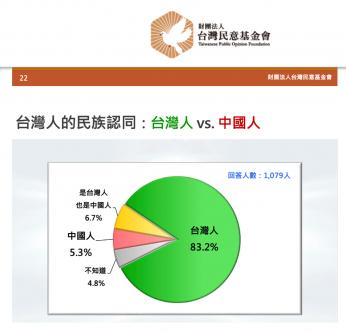Identification as Taiwanese rather than Chinese has surged to 83.2 percent amid the COVID-19 outbreak that began in Wuhan, China, the Taiwanese Public Opinion Foundation said yesterday.
Asked whether they identify themselves as Taiwanese or Chinese, or have other opinions, 83.2 percent of respondents to a poll conducted by Focus Survey Research said Taiwanese, 5.3 percent said Chinese, 6.7 percent said both and 4.8 percent had no opinion or refused to answer.
The results showed that identification as Taiwanese has reached a new high since the foundation’s first such poll in 1991, while identification as Chinese or Chinese and Taiwanese was down by half from a poll in September last year, foundation chairman Michael You (游盈隆) said.
Neither Chinese President Xi Jinping’s (習近平) reiterations of Beijing’s “one country, two systems” formula, nor last year’s protests in Hong Kong led to a significant increase in identification as Taiwanese, which remained at about 70 percent, You said.
There has been an obvious increase since the COVID-19 outbreak, and such change can be seen as significant academically and politically, he added.
Respondents were also asked about the government’s handling of cross-strait issues during the outbreak, with nearly 70 percent voicing approval, and 10.8 percent saying they disapproved, the foundation said.
It is the best rating of the government’s cross-strait policies since President Tsai Ing-wen (蔡英文) took office in May 2016, the foundation said.
Tsai’s overall approval rating was 68.4 percent, compared with 16.5 percent who disapproved, the president’s second-best showing in a foundation poll, while Premier Su Tseng-chang (蘇貞昌) received a 69.4 percent approval rating.
More respondents said they liked the Democratic Progressive Party (41.1 percent), than the Chinese Nationalist Party (KMT) (12.5 percent), the Taiwan People’s Party (9.3), the New Power Party (5.1), the Taiwan Statebuilding Party (1.9) and the People First Party (0.5).
However, 27.2 percent said that they did not favor any party and 0.9 percent said none of the above.
The nationwide poll was conducted on Monday and Tuesday last week and collected 1,079 valid samples. It had a margin of error of 2.98 percentage points.
Source: Taipei Times - 2020/02/25





















